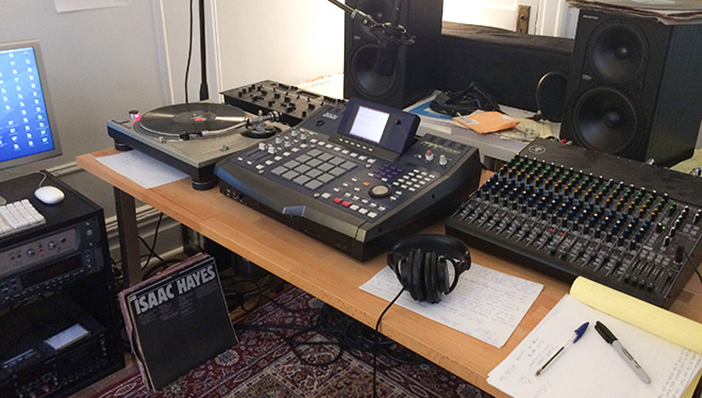Concepts, themes, and theories over gear, equipment, and plug-ins — It’s about the beatmaker and his setup, not the setup and the beatmaker.
All musicians have their preference for instruments as well as the brand behind the instrument. But most musicians (or at least the more capable ones) also know that without talent and skills — the kind earned from understanding fundamental music concepts and themes as well as the prioritized concepts, themes, and theories within their chosen genre — it doesn’t matter which instrument you choose, you’re likely to make sub-par music. Beatmakers are no different from other musicians in this regard.
The EMPIs (Electronic Music Production Instruments) that we choose say a lot about our approach to beatmaking, our personal style, knowledge base, musical experience, and overall creative sensibilities. Further, like the style and sound of beats we choose to make, the EMPIs we prefer to use are an affirmation of which beatmaking school of thought we want to be (and see) ourselves aligned with. And as a musician of any form, not just beatmakers, knowing the artistic — creative, aesthetic — school of thought you want to honor and work within is important. Thus, all of the nuance that often surrounds your selection of a specific EMPI is understandable. That said, EMPIs don’t make the beats themselves (although, I won’t deny that some EMPIs now come with easy-button functions; but that’s another topic). Instead, EMPIs serve at the talent, experience, and understanding of the beatmakers who use them.
In recent years, there has been an explosion of EMPI choices, each released into the marketplace with a wave of marketing and promotion. So who could blame today’s new beatmakers for feeling overwhelmed by all of the gear options? (I know I’d feel that way if I just started making beats.) But even before the number of options increased, two big problems existed in the beatmaking community: (1) A lack of commitment to developing skills and understanding; and (2) gear chasing.
For instance, what good is a sampler with virtually unlimited sampling time if you have a shaky understanding of the art of sampling? Or what good is a sampler with multiple chopping functions if you don’t quite understand chopping? What good is any sequencer (hardware or software) if you don’t really understand beat construction, arrangement, or the vital role that chopping plays in the arrangement of beats? Certainly, just as there is a difference between knowing how to use a drill and being a carpenter, there’s a difference between knowing how to use a piece of hardware or a software program and being a skilled beatmaker.
In the past 15 years, I’ve been to the studios and production hubs of many different beatmakers (producers), both well-known and lesser-known. In each case, I was able to see their production setups and ask detailed questions about them. Here’s the most striking take away that I can share: Most well-known beatmakers (producers) tend incorporate new EMPis and the like only when it’s absolutely necessary. As I state in The BeatTips Manual, “The biggest well-known beatmakers do not forfeit or abandon their setups every time a new piece of gear comes out. That’s crazy. They’re cookin’ with the cookware that helped them make their most famous dishes.” That is to say, they almost never veer away from their main production tools. When 9th Wonder goes from Fruity Loops to the MPC to the Maschine, it reflects the necessity for where he’s at as a musician. When DJ Premier moves from the MPC 60 II/S950 setup — his main production tools for more than 25 years — to the MPC Renaissance, it’s a reflection of his growth as a musician and the realities of his expanding musical opportunities.
Many well-known beatmakers (producers) augment their setups with new pieces of gear here and there or update computer hardware/software, but they never fall into the mode of gear chasing. I understand what it means to struggle to find the right setup that works best for you, but chasing new gear as cover for (and distraction to) a lack of musical development is never a good path to follow. There are beatmakers (producers) who swapp setups multiple times over short periods, and there are beatmakers (producers) who acquire every new major production tool that comes to market. One common downside to this is that the focus shifts from musical development and better beats to little more than gear chauvinism.
Gear talk is legitimate. In our field, discussing the production tools that we currently employ, that we used in the past, and that we’re considering using in the future is common in our community. But as an art form, craft, and trade, beatmaking has parallels to photography, inasmuch as both require knowledge of the art form and the tools associated with the craft, and many of the members of both communities maintain strong allegiances with brands. Moreover, just as there is rapid, ongoing development in production tools, there has been and continues to be a number of developments in photography, most notably in the digital spectrum. Also, the professional camera market is loaded with different cameras to choose from. Yet, no serious photographer dumps their camera every time a new model appears. It’s not practical, and it does not help a photographer better understand photography.
Likewise, gear chasing and gear talk alone does not necessarily help you better understand the art of beatmaking. Shop talk about setups, functions, and expanded capabilities is fine and often useful. But shop talk that is void of thoughtful discussions about the art of beatmaking itself — including concepts, themes, theories, technique, methodology, artistic goals, or creative integrity — is a detriment to your development as a beatmaker. Always remember the proper order: It’s about you and your setup, not your setup and you.
